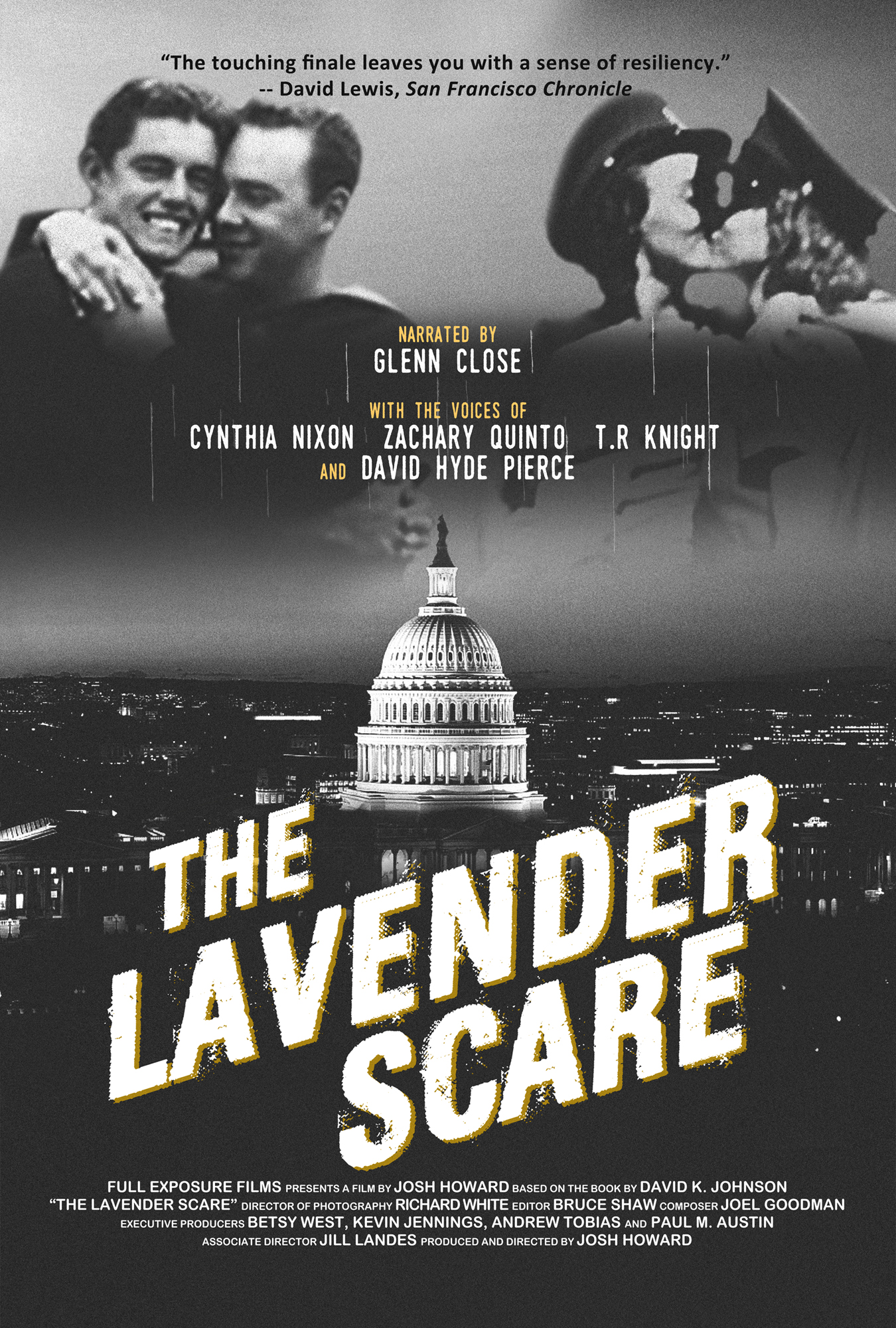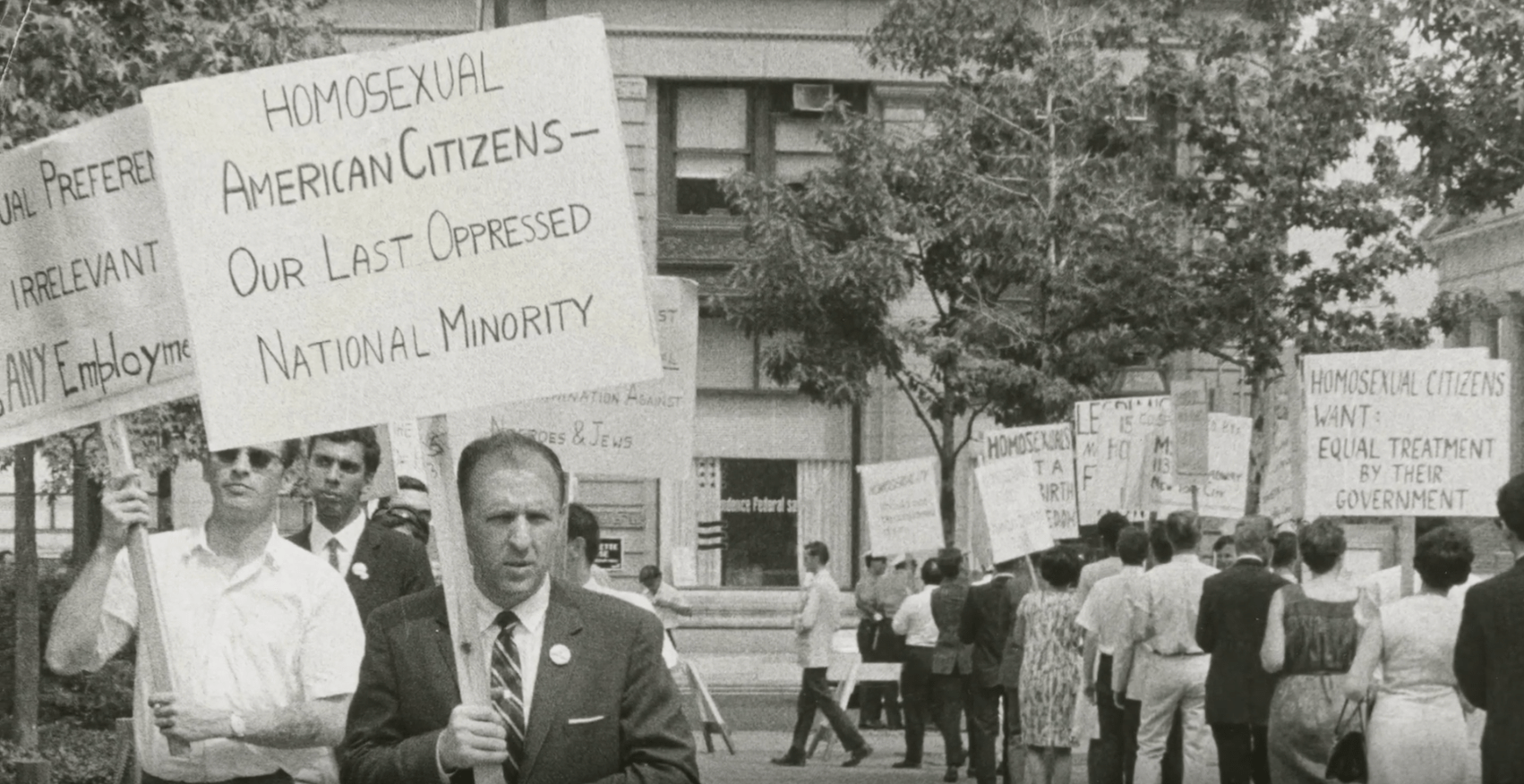In 1953, President Dwight D. Eisenhower put thousands of lives at risk, when he signed an executive order that declared gay men and lesbians working in the government a security risk. As a result, over the next four decades, queer employees were interrogated and fired from federal jobs spanning The State Department to the military. At first the firings were public, dangerously outing those who had lost their jobs, and then they became more quiet, hiding the extent to which the community was actually affected.
The policy thrived in the midst of the Red Scare following World War II, when US citizens were convinced that being gay made people more susceptible to foreign manipulation. While many history books highlight the fear of communism during this time, many neglect to recount what author David K. Johnson coined “The Lavender Scare.” This forgotten time in history is revisited in a new documentary of the same name. Through the film, which is narrated by Glenn Close, we see how these discriminatory practices ruined people’s lives and meet the brave activists like Frank Kameny, who had the courage to fight back.
i-D spoke with director Josh Howard about the award-winning film, what he learned while working on it, and how the LGBTQ community is still at risk today.
Why did you want to make this film?
Well I came across this book called The Lavender Scare and I was just blown away by it. The story about tens of thousands of gay men and lesbians that were fired by the federal government or denied employment by the government. It was something I knew nothing about. In conversations with other friends and other gay historians they didn’t know about it. It just seemed like an important film to be made.
What was the process of making the documentary?
Well it started with me reading the book by David Johnson, which is really the editorial framework for the film. We started raising money and that’s one of the reasons this has been a nine year saga. I haven’t worked on it full-time for all nine years, but it was a long process of applying for grants and doing the Kickstarter and raising money. We were also up against a ticking clock, frankly because so many of the characters in the film were elderly. We wanted to get their stories while we could.
Was there anything that you learned while making the film that you didn’t even realize when you read the book?
We were able to track down several of the government officials who were responsible for instituting the policy and carrying it out, more so than the book really got into. What really surprised me was, first of all, that they agreed to be interviewed for this project, secondly, that they defended what they did in the 50s. I was kind of expecting an apology or “we shouldn’t have done it.” Their position was that at the time, they absolutely did the right thing. They did allow that they wouldn’t do the same thing today, but they were not the least bit backing away from the importance in their eyes of this policy in the 50s.
Why do you think that so many people aren’t even aware of this time in history?
Well it was kind of a conspiracy of silence when this was going on because the gay people who were being fired wanted to stay in the closet. They had to find other jobs and they had to deal with friends and family. To a large degree this was a time when people were not out and in the overwhelming number of cases, the people were allowed to quietly resign for “health reasons,” so the records wouldn’t show that they’ve been fired for being gay, so the people being fired wanted to keep the secret.
After a while the government stopped announcing how many people they were firing because the question had become, “Well why did you hire them in the first place? Why are you only now finding out that you’ve hired these dangerous immoral people in the government?” They stopped talking about it and it really wasn’t until the 90s when a lot of personnel records were released. The records that had been classified, so the full scope of this really became known.
I’ve done probably 100 film festivals and there is hardly a festival that happens at which someone doesn’t come up to me afterwards and say “I worked for the government, I’m gay, and I was fired.” I’m always shocked at how many people are telling me this. I think, I shouldn’t be shocked, I should know this, I just did the movie about this. But the extent of how widespread this was and how few people know about it is really stunning and and again that’s what drew me to to make the film.
It’s been 50 years since the Stonewall Riots. What do you think we can learn now from looking back?
Well obviously Stonewall was a major milestone in the movement. I think one thing we should learn is that there were courageous and forward-looking people before Stonewall whom really sowed the seeds of what would become the movement. I think people like Frank Kameny, Barbara Gittings, Jack Nichols, and Lilli Vincenz, really deserve to be recognized and particularly because they demonstrate how political action and determination can really make a difference. I think that’s such an important message of Stonewall and in the years pre-Stonewall. No one is going to protect our rights for us, we have to do it ourselves.

Were you surprised to find out how many people still don’t realize the state that we’re in now and the laws and rules that are so prohibiting the LGBTQ community from things like employment?
Absolutely. There are 29 states in which it is perfectly legal to fire someone just because they’re gay, it doesn’t have to be another reason. I think people are shocked to hear that.
The alarming thing is you know there are signs that we’re going in the wrong direction on this issue, with some of the religious liberty initiatives of the Trump administration and you know the appointment of clearly anti-gay judges. So I hope this film brings some of these issues to light and and gets people thinking about them.
Besides winning several awards, what has been the response that you’ve had to the film?
Well I think the main reaction is always, “how come I didn’t know that this?” One of the reasons as we discussed is people didn’t talk about it, but another reason is that gay history is not taught in schools. I think one of the nice reactions I’ve gotten is that I’ve been invited to several high schools to do screenings and do talks. I was at a LGBT youth club at a high school here in New York a couple weeks ago and I was thinking, when I was in high school the letters “L, G, B, T,” we’re in the alphabet, but they were never used together. It’s really gratifying that people are recognizing the educational value of this and that the message is getting out.
The Lavender Scare is in select theaters in LA and New York now, with a national release to follow. The film will also be screened on PBS on June 18.
